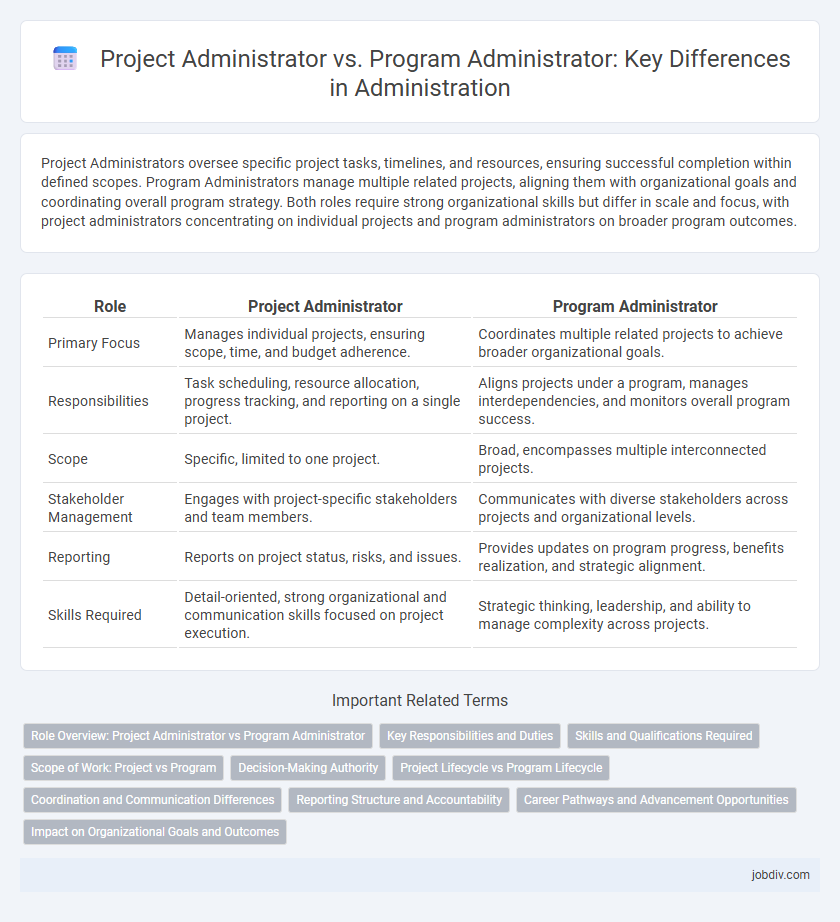Project Administrators oversee specific project tasks, timelines, and resources, ensuring successful completion within defined scopes. Program Administrators manage multiple related projects, aligning them with organizational goals and coordinating overall program strategy. Both roles require strong organizational skills but differ in scale and focus, with project administrators concentrating on individual projects and program administrators on broader program outcomes.
Table of Comparison
| Role | Project Administrator | Program Administrator |
|---|---|---|
| Primary Focus | Manages individual projects, ensuring scope, time, and budget adherence. | Coordinates multiple related projects to achieve broader organizational goals. |
| Responsibilities | Task scheduling, resource allocation, progress tracking, and reporting on a single project. | Aligns projects under a program, manages interdependencies, and monitors overall program success. |
| Scope | Specific, limited to one project. | Broad, encompasses multiple interconnected projects. |
| Stakeholder Management | Engages with project-specific stakeholders and team members. | Communicates with diverse stakeholders across projects and organizational levels. |
| Reporting | Reports on project status, risks, and issues. | Provides updates on program progress, benefits realization, and strategic alignment. |
| Skills Required | Detail-oriented, strong organizational and communication skills focused on project execution. | Strategic thinking, leadership, and ability to manage complexity across projects. |
Role Overview: Project Administrator vs Program Administrator
Project Administrators oversee the planning, execution, and closure of individual projects, ensuring timelines, budgets, and resource allocation are managed effectively to meet specific project goals. Program Administrators coordinate multiple related projects, aligning them with overarching organizational strategies and managing interdependencies to achieve broader program objectives. Both roles require strong organizational and communication skills but differ in scope, with Project Administrators focusing on discrete project management and Program Administrators handling strategic oversight of interconnected projects.
Key Responsibilities and Duties
Project Administrators manage specific projects by coordinating schedules, resources, and deliverables to ensure timely completion within scope and budget. Program Administrators oversee multiple related projects, aligning them with organizational goals, monitoring overall progress, and managing interdependencies to achieve strategic outcomes. Both roles require strong communication and organizational skills but differ in scope, with project administrators focusing on individual projects and program administrators handling broader program-level coordination.
Skills and Qualifications Required
Project Administrators require strong organizational skills, proficiency in project management software, and the ability to manage timelines, budgets, and resources effectively. Program Administrators need advanced leadership skills, strategic planning expertise, and experience coordinating multiple related projects to achieve broader organizational goals. Both roles demand excellent communication, problem-solving abilities, and a solid understanding of administrative procedures.
Scope of Work: Project vs Program
Project Administrators manage specific projects with defined objectives, timelines, and deliverables, ensuring tasks are completed on schedule and within budget. Program Administrators oversee multiple related projects, coordinating resources and aligning goals to achieve broader organizational outcomes. The scope of work for Project Administrators is task-focused and finite, while Program Administrators maintain a strategic viewpoint across interconnected projects to drive long-term success.
Decision-Making Authority
Project Administrators typically have decision-making authority limited to the specific project scope, managing day-to-day operations, resource allocation, and immediate issue resolution. Program Administrators hold broader decision-making power across multiple related projects, ensuring alignment with organizational strategic goals and prioritizing resources at a higher level. Their authority extends to setting program-wide policies, risk management, and coordination among project teams to achieve overarching objectives.
Project Lifecycle vs Program Lifecycle
Project Administrators oversee specific project lifecycles, managing tasks such as planning, execution, monitoring, and closing to ensure individual project goals are met efficiently. Program Administrators coordinate multiple related projects across the program lifecycle, aligning them with strategic objectives and managing interdependencies and resource allocation for overall program success. The distinction lies in the Project Administrator's focus on discrete deliverables within a single project, while the Program Administrator ensures cohesive progress across multiple projects to achieve broader organizational benefits.
Coordination and Communication Differences
Project Administrators concentrate on coordinating tasks within a single project, managing schedules, resources, and team communication to ensure timely completion. Program Administrators oversee multiple interconnected projects, facilitating communication across diverse teams and aligning objectives with organizational goals. Their role demands broader coordination, integrating efforts to optimize resource allocation and strategic outcomes.
Reporting Structure and Accountability
A Project Administrator typically reports to a Project Manager and is accountable for the execution of individual project tasks, ensuring timelines, budgets, and scopes are adhered to within a single project framework. A Program Administrator reports to a Program Manager or Director, overseeing multiple related projects, coordinating between project teams, and maintaining alignment with broader organizational goals. Accountability for Program Administrators extends to managing resources, tracking program-level metrics, and reporting on the collective progress and impact of associated projects.
Career Pathways and Advancement Opportunities
Project Administrators often start their careers managing individual projects, developing skills in scheduling, budgeting, and stakeholder communication, which can lead to roles like Project Manager or Project Coordinator. Program Administrators oversee multiple related projects, gaining expertise in strategic planning and resource allocation, positioning them for advancement into Program Manager or Portfolio Manager positions. Both pathways offer growth, but Program Administrators typically progress toward higher-level management due to their broader scope and impact on organizational goals.
Impact on Organizational Goals and Outcomes
Project Administrators drive specific project success by managing scope, timelines, and resources, directly contributing to short-term organizational objectives. Program Administrators oversee multiple related projects, aligning them with strategic goals and ensuring cohesive progress toward long-term organizational outcomes. Their role amplifies impact by coordinating interdependencies and optimizing resource allocation across projects for sustained organizational growth.
Project Administrator vs Program Administrator Infographic

 jobdiv.com
jobdiv.com